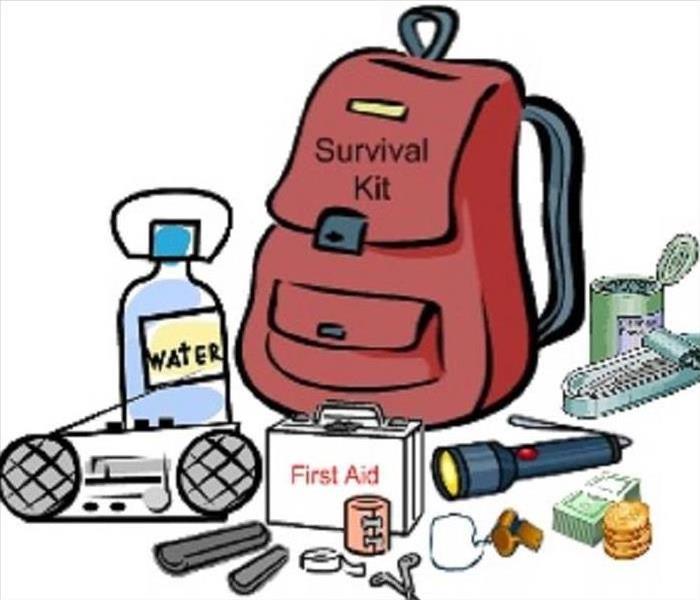7 Must-Have Items For Your Storm Emergency Kit
4/13/2020 (Permalink)
7 Must-Have Items For Your Storm Emergency Kit
When it comes to hurricanes and tornadoes, you can't be too prepared. Atlantic Hurricane Season runs from June 1 to November 30, and while tornadoes can occur any time of the year, peak season is May and early June for the Southern Plains, early spring for the Gulf Coast, and June and July in the Northern Plains and Upper Midwest. No matter where you live, it's never too early to gather supplies and put together your storm emergency kit. Use these helpful hacks to create your own storm emergency kit with items you probably already have around your house.
- The Basics: Of course, no hurricane emergency kit would be complete without first-aid supplies, personal medications, non-perishable food for a minimum of three-to-five days (including baby formula), clean water, toilet paper, soap, emergency blankets, matches, and a flashlight with extra batteries. These are also the first to fly off the shelves as soon as a hurricane watch is issued.
Pro Tip: Make sure to include a manual can opener in your kit for your non-perishable food items.
- Bleach: You should have at least a gallon of clean water per person per day for three-to-five days in your emergency kit. But if you're running low on clean drinking water and can't boil any, the CDC recommends that you use unscented household bleach as a method of water purification. Add one-eighth of a teaspoon of unscented bleach to a gallon of water, mix it well, and let it stand for at least 30 minutes before drinking.
Pro Tip: Do not use bleach that is six months or older, and be sure to open windows or doors to get fresh air when using bleach.
- Goggles, Work Gloves and Breathing Masks: If you have damage during a hurricane or tornado, this protective gear will come in handy during cleanup. It can help keep you from being contaminated by exposure to harmful materials like lead, asbestos, cement, or mold.
- Trash Bags: There are several ways that trash bags can come in handy during a hurricane or tornado emergency. In addition to their obvious function, you can wear trash bags as rain ponchos, use them as temporary tarps, or to collect rainwater. And since they don't have an expiration date, you can stock up.
- NOAA Weather Radio (NWR): A battery-powered All Hazards NOAA Radio is a must-have in a weather emergency. With over 1000 stations across the 50 states4, it provides 24/7 live updates from the National Weather Service on weather and emergency information. You can also get live updates from the NWR on the FEMA app, but only if you have cell service and a charged battery.
Pro Tip: Don't wait until a storm emergency to buy a NWR receiver, because that's when stores sell out. If you can't get a NWR, a hand crank or battery-powered radio with extra batteries works too.
- Hand Tools: You probably already have a screwdriver, wrench, and pliers in your home (if not, read 10 Things Every Handy Homeowner's Toolkit Should Have), so you'll want to keep them handy in your emergency kit. You may need a wrench or pliers for turning off utilities, and a screwdriver to remove storm shutters from your windows after a hurricane.
Pro Tip: Familiarize yourself with your home's utilities and know how to access the water, gas, and power shut-off valves in advance. - Home Inventory:
Creating a list of your belongings is an extremely important step in emergency storm and claims preparedness. Take stock of everything in your home, so you have it documented before a hurricane or tornado is approaching. Having this record will make the claims process much easier if damage occurs.
Now that you know what should be in your emergency storm kit, you can get a head start on stocking yours with the non-perishables and tools you hope you won't need. It'll save you a hectic trip to the store and ensure you’re ready for the next storm that comes your way.





 24/7 Emergency Service
24/7 Emergency Service
